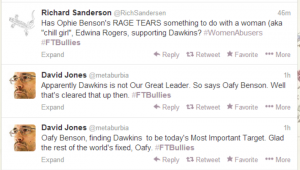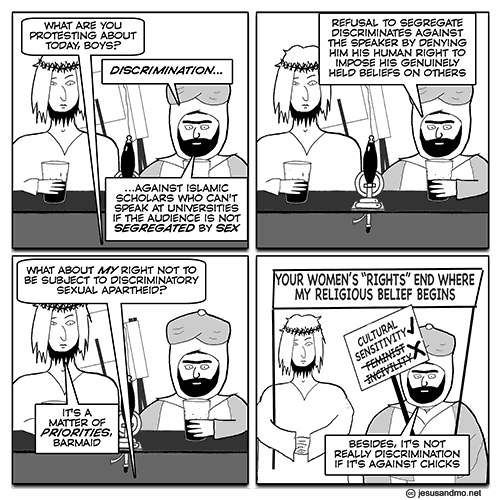The National Post gives more detail on the Israeli woman fined by a rabbinical court for refusing to allow her infant son to be circumcised.
The mother, whose name was given only as Elinor, said her son had been born with a medical problem that prevented him undergoing ritual circumcision on the eighth day after birth, as is customary in Jewish law.
“As time went on, I started reading about what actually happens in circumcision, and I realised that I couldn’t do that to my son.
“He’s perfect just as he is,” Haaretz newspaper quoted her as saying. In their ruling, the three rabbis wrote: “Circumcision is a standard surgical procedure that is performed on every Jewish baby boy, so when one of the parents demands it, the other cannot delay it except where it is proven to be medically dangerous.”
What? That “so” is bogus – what comes after it doesn’t follow from what came before.
One, “standard surgical procedure” is meaningless and deceptive. “Standard” how, in what sense, according to whom, and above all for what medical reason? In other words, no it’s not. Yes it’s “surgical” in the literal sense, and “standard” in the sense that a lot of people do it, but “standard surgical procedure” implies that it’s medically required or at least beneficial, and it’s neither. Two, given the emptiness and deception of that clause, the claim that “the other cannot delay it” is arbitrary and ridiculous. That’s why rabbis as rabbis should have nothing whatsoever to do with ordering people to have their infants cut up.
To put it another way, religious law should never ever be enforced on people who don’t want to be bound by it. That’s because it has no legitimacy derived from this-world principles of representation and universality.
“Fulfilling the command of circumcision is not a [mere] surgical medical act … Brit milah [the rite of circumcision] is exactly what it says: a covenant that God made with His chosen people, the nation of Israel.”
And that is precisely why it can’t be binding on anyone who doesn’t accept it, including believers who don’t accept specific “laws” and “covenants.”
The judgment was upheld by a higher rabbinical court after the mother appealed against the decision. The appeal ruling warned that a verdict in her favour could trigger “a flood of [similar] cases,” giving a “terrifying dimension” to divorce proceedings.
“This trend must be stopped immediately for the common good, which takes precedence over that of the individual,” the judges concluded.
So all the boy infants must have their penises cut “for the common good.” Even though the actual “common good” is very hard to discern.
They added: “Removal of the foreskin prepares the soul [of the baby] to accept the yoke of Heaven and study God’s Torah and commandments.”
All the more reason to refuse! Keep your fucking yoke of heaven and your fucking god’s commandments.
Rabbinical courts are part of Israel’s judicial system and are overseen by the ministry of religious services. In addition to holding exclusive jurisdiction over the marriage and divorce of Jews, they have the power to rule on matters of personal status, alimony, child support, custody and inheritance.
That is terrifying. There is no secular marriage for Jews in Israel, so that means all married Jews in Israel are subject to the power and arbitrary decision-making of rabbis on things like alimony and child custody. All of them! Including the atheists!
Their rulings are enforced by the police and other legal agencies in the same way as those of civil courts.
Terrifying.
The rulings were made against a backdrop of rising concern in Israel over recent attempts in Europe and elsewhere to prohibit ritual circumcision on humanitarian grounds. Israeli officials and rabbis claim the trend is prompted by anti-Semitism.
Israel’s foreign ministry condemned the parliamentary assembly of the Council of Europe last month after it adopted a resolution calling for regulation of religious circumcision, which is also carried out on Muslim boys shortly after birth.
The foreign ministry demanded that the resolution be annulled, saying it “casts a moral stain on the Council of Europe and fosters hate and racist trends in Europe.”
No, actually, it’s the other way around. Accusing a humanitarian prohibition on cutting infants’ genitalia of fostering hate and racist trends casts “a moral stain” on Israel’s foreign ministry.
(This is a syndicated post. Read the original at FreeThoughtBlogs.)





